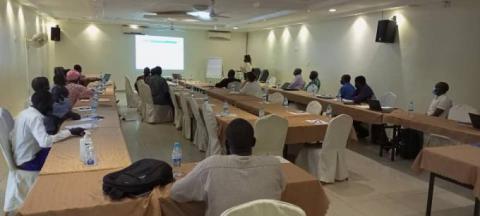ECW-MYRP supports education in emergency partners to validate education needs assessment for South Sudan.

MYRP South Sudan Education Cluster meeting in Juba. Photo: Daniel Danis
November 11, 2021 - Juba South Sudan: Members of the South Sudan Education Cluster have met in Juba to validate key findings and themes from an Education Needs Assessment recently conducted through the Multi-Year Reslience Programme (MYRP) supported by the Education Cannot Wait (ECW) project.
The cluster members provided their feedback on the research document presented by a consultant on Education Needs Assessment in South Sudan.
Save the Children International together with the Norwegian Refugee Council and Finn Church Aid, as the grant agents, are supporting the Ministry of General Education and Instruction through the Education Cluster to focus on the Education Needs Assesment within the Humanitarian Needs Overview. The overview will feed into the Humanitarian Response Plan after the validation by participants from MoGEI and other Education in Emergency partners.
The Humanitarian Needs Overview shows that food insecurity, folds, violence, and conflicts significantly affect regular attendance to and retention at school, among other needs and demand barriers. In addition, the 2021 data from the School Attendance Monitoring System (SAMS) shows that gross enrolment in South Sudan accounts for slightly over 2.5 million learners enrolled in Early Childhood Development (ECD), primary and secondary education, of which 48.8% are female learners. This is slightly lower than the 2020 statistics which indicated that the number of out-of-school children in South Sudan was 2.8 million - of which 53% were girls and 20-60% were children with disabilities.
As part of the efforts to support Education in Emergency, the draft findings of the current Education Needs Assesment, among others, indicate that the least likely group of children to participate in education are; children without a parent or guardian, Child-headed households, Learners with disabilities, Young mothers, Married learners, and Pastoralists children. County officials, education leaders, and community members attributed the reasons for school dropouts particularly among girls to marriage, pregnancy, domestic duties, School fees, and lack of food and school fees.
Additionally, cases of dropout among boys were attributed to lack of school fees, Cattle rearing and lack of food, Employment, Marriage, Insecurity in or around schools. The respondents also noted that there is an inadequate number of schools in the remote areas of South Sudan following years of conflicts.
George Mogga, the Director-General of the Directorate of Planning and Budgeting in the Ministry of General Education and Instruction said:
“Most of the returnees are coming to a village without school, but before they left, there were schools. However, most have expressed interest in joining TVET to earn skills for making a living.”
The TVET opportunity is in line with ECW’s objective of ensuring that out-of-school children (OOSC) in priority areas have flexible, responsive routes into learning opportunities that support their transition into further levels of education and their holistic wellbeing and development.
Some of the needs projected by the respondents include regular payment of teachers’ salaries, rehabilitation of school infrastructure, including classrooms, supply of teaching and learning materials, school equipment such as benches and chalkboards, school feeding programs, and assistive devices for persons living with disabilities, among others.
“This validation is for us to present what is really happening on the ground. If we don’t do our work, the humanitarian intervention in South Sudan will continue for a very long time. But if we do well, the interventions will reduce,” Mr. Mogga stated.
About ECW/MYRP
Education Cannot Wait is the first global multilateral fund dedicated to education in emergencies and protracted crises. Through the South Sudan Multi-Year Resilience Programme (MYRP), ECW project aims at ensuring that out-of-school children (OOSC) in priority areas have flexible, responsive routes into learning opportunities, that support their transition into further levels of education and that support their holistic wellbeing and development. It also focuses on increased access to learning opportunities, improved quality and continuity of education, enhanced school safety, mental health, psycho-social support, gender and inclusive education.
Save the Children International, Norwegian Refugee Council (NRC) and Finn Church Aid (FCA) as grantee agencies work together with 17 Implementing Partners across 6 States in South Sudan – under the leadership of the Ministry of General Education and Instruction.
Story by Daniel Danis/Save the Children
 South Sudan
South Sudan